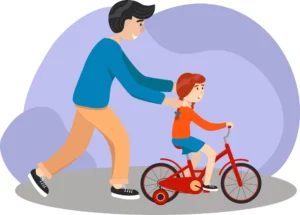Grammar
Let’s complete all verb forms in our list of regular verbs:
I
you
he, she, it
we
you (plural)
they / you (formal)
kommen
ich komme
du kommst
er, sie, es kommt
wir kommen
ihr kommt
sie/Sie kommen
I
you
he, she, it
we
you (plural)
they / you (formal)
wohnen
ich wohne
du wohnst
er, sie, es wohnt
wir wohnen
ihr wohnt
sie/Sie wohnen
I
you
he, she, it
we
you (plural)
they / you (formal)
arbeiten
ich arbeite
du arbeitest
er, sie, es arbeitet
wir arbeiten
ihr arbeitet
sie/Sie arbeiten
Apart from avoiding the double t and the strange ‚tst‘-ending by adding an extra e in arbeitet and arbeitest, we can see a general pattern with regular verbs:

Remember: At the moment you’re still riding with training wheels. That means, in our writing exercises it is currently no problem if you forget a punctuation mark (,.!?) or disregard upper and lower case. But that will change soon! In the future, all nouns and sentence beginnings must be written in upper case and the rest in lower case.
2 Correct the mistakes
Correct the verb only if the pronoun-verb-combination doesn’t exist in the German language. Otherwise write ” – “.
If you can’t write ä, ö, ü, and ß then replace them with ae, oe, ue, and ss.
![]()
Watch and repeat
Have you ever wondered how to pronounce these letters with two dots on top of them? Ä, Ö, and Ü are all closely linked to their ‚normal‘ versions A, O, and U.
Ä: Take the normal A, and move your jaw half an inch forward
Ö: Now take the O, move your jaw half an inch forward, and make a slightly upward angled fish mouth
Ü: And lastly, say the U, move your jaw half an inch forward, and make a slightly upward angled fish mouth
6 Responses
Hi, I am a bit confused. i corrected the ‘sie’ cause i assumed it is referred to as she but the answer said sie as in they. in this case how do we differentiate the sie between she and they?
Hi! Take a look at the grammar above: for “arbeitet”, for example, it’s sie (she) arbeitet BUT for “arbeiten” it can only be sie (they) / Sie (you – formal).
Hello, I think several people are seeing the same mistake but is not corrected, so on the expression sie machen, if we are meant to place the word machen rather than macht, we wont be able to note if this is a she or a they, and as no other context on the sentence, this is a 50-50 to get it wrong, maybe change it to Sie (formal you) so we can distinguish we are meant to be writing the infinitive form rather than the -she- conjugation??
this is ow we see it and why it is confusing:
sie machen correction to: macht – Wrong
No… The correct answer is “-” because “sie machen” is already correct. It means they do.
thanks
Hi!
Thanks for pointing this out. Generally speaking, I think the confusion was in the wording. You guys were thinking (for example) that “sie macht” (she does) is wrong because you had “sie machen” (they do) in your minds.
So I changed the wording from “right” and “wrong” to “Does this pronoun-verb-combination exist in German”. If it exists, then there’s no need to change anything. If not, you need to change it. It does not matter if “sie” means she or they. It only matters if that pronoun-verb-combination exists.
In your example, “sie machen” (they do) exists in German. So no need to change anything, just write “-“.
Happy learning!
Hi! I guess you meant just make a dash but not use “-“! Exercise 2 , lesson 8
That’s right!